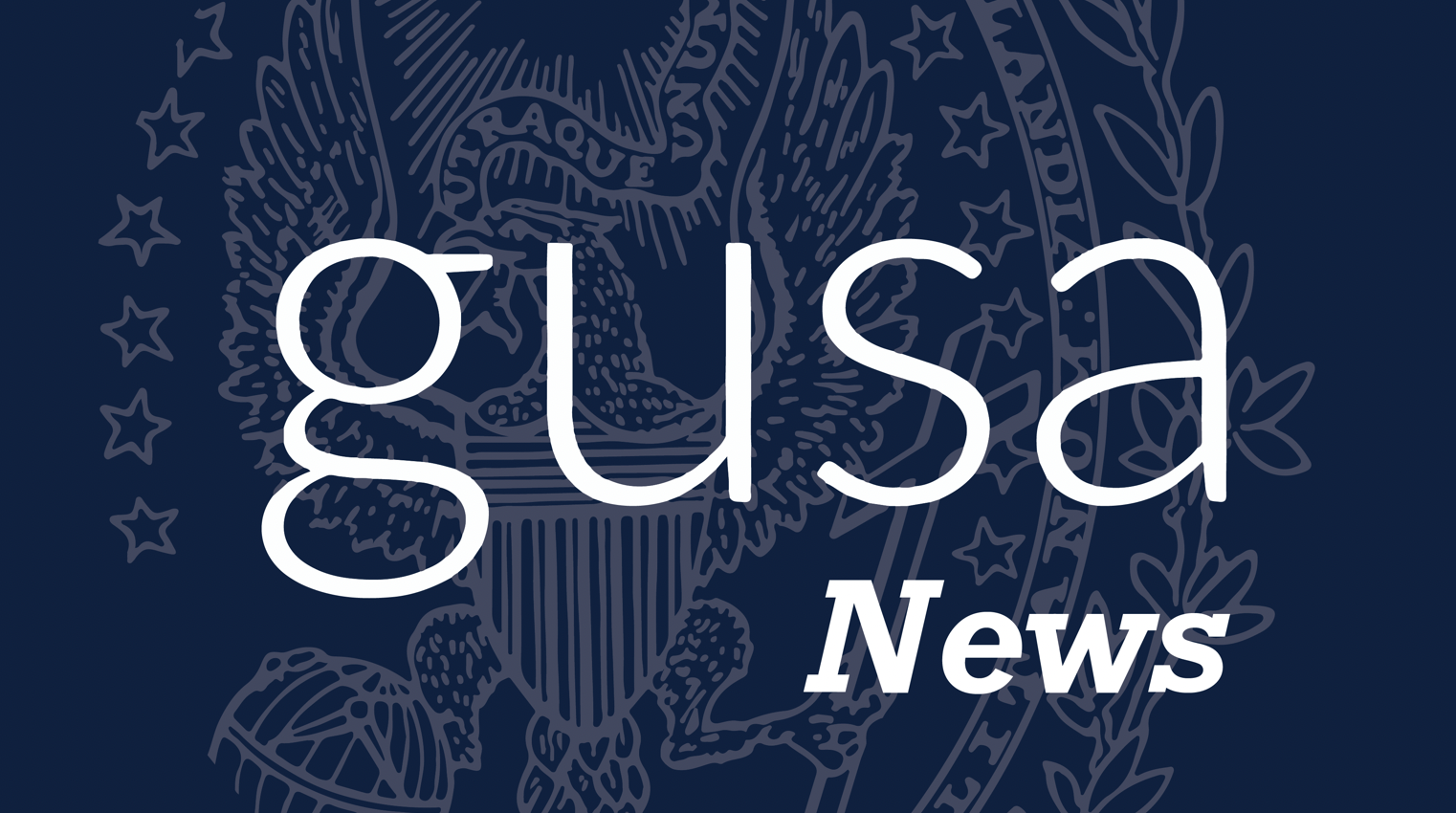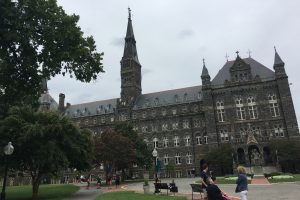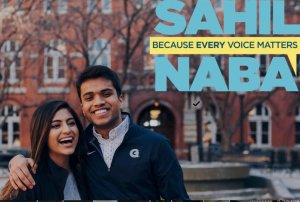After turning in their ballots for federal and state elections, it’ll be time for Hoyas to cast their votes again, this time for the next GUSA Executive team. Elections open on Tuesday, Nov. 5 at 8 p.m., and students will be emailed a link to vote on Qualtrics until Thursday, Nov. 7 at 8 p.m.
This year, two tickets are running for the executive election, each with competing visions for what GUSA can accomplish in an executive term, as well as different backgrounds in student government and on-campus organizing.
The Voice interviewed each of the tickets to hear more about their platforms and their goals.
President Allie Sanchez (MSB ’26) and Vice President Paul Sperber (CAS ’26)
With a campaign focused on “fixing the little things,” the Sanchez-Sperber ticket is focused on resolving some of the day-to-day concerns students have around accessibility, transportation, dining, and club culture at Georgetown.
“A lot of the complaints about Georgetown are these small, day-to-day annoyances,” Sanchez said. “Broken doors, elevators that are too slow, there’s no water bottle fillers on campus.”
Much of their platform is centered on these accessibility issues, as well as expanding access to other resources like trash cans around campus and improving the equipment at Yates.
Sanchez and Sperber also have plans to expand on-campus dining, such as keeping upstairs Leo’s open on weekends and extending downstairs hours to 9 p.m. on weekdays.
The Sanchez-Sperber ticket does not have specific plans to address some of Georgetown’s larger institutional practices, such as maintaining legacy admissions or holding investments in companies with ties to the Israeli military. The candidates explained their positions on legacy and divestment are based on what they see as a realistic understanding of what GUSA is actually able to achieve.
“I think it’s really important that as a student government, we stay pretty realistic in the things that we’re dealing with. And at the end of the day, Georgetown is kind of like a business in itself, and I don’t think we necessarily have the power to do that,” Sanchez said.
In the past GUSA has been part of institutional change including holding referendums on gender inclusive housing, establishing reparations for the GU272+, and divesting from fossil fuels, which while their outcomes are non-binding, did prompt campus conversations and help create eventual change on those issues.
The candidates offered a similar point of view on how they plan to respond to the demands of Students for Justice and Palestine and similar groups. These organizations are advocating for working groups for Palestinian, Arab and Muslim students to feel safe on campus and ensure their protection from discrimination, as well as ending Georgetown’s study abroad programs in Israel.
“We would definitely be open to conversations with the student body, with student leaders, and also with the administration,” Sperber added. “But I think it’s important to just recall what Allie said earlier, just in terms of the scope of student government and that we have to be realistic.”
While many of its key ideas are focused on facilities and campus resources, the Sanchez-Sperber policy platform also aims to improve Georgetown’s exclusive club culture by proposing financial incentives for students to start clubs with fewer barriers for new members to join. Sanchez said these kinds of measures would help alleviate the exclusion that first years and students with marginalized identities face on campus by expanding opportunities for more inclusive clubs to start.
“That’s a big part of our platform as well, this welcoming feeling of Georgetown. And a big thing right now is the club culture is terrible here, and especially for freshmen,” Sanchez said. “I think that’s a huge complaint that they have is that if you maybe don’t necessarily fit into a category you feel kind of out of place.”
The Sanchez-Sperber ticket would bring two brand-new faces to GUSA—neither of them have held a position in student government before—and the candidates said their perspective as newcomers will help students feel more connected to the executive representing them. They told the Voice that they would increase interaction with GUSA through town hall events and Google Forms where students can submit their concerns to student government.
“A huge step in the right direction for GUSA’s reputation would be if there were some fresh faces in GUSA, that these people actually engage with the students and get things done that the students want to see, things that affect minor annoyances that affect students’ day to day lives,” Sperber said.
President Ethan Henshaw (CAS ’26) and Vice President Darius Wagner (CAS ’27)
Henshaw and Wagner’s campaign is built on the team’s history with on-campus organizing and experience in GUSA. The candidates are probably best known as co-founders of Hoyas Against Legacy, a student group advocating to end legacy admissions at Georgetown. They have both worked to advance various causes on campus, helping organize and campaign for last year’s Gender-Inclusive Housing referendum.
“We’ve been working together kind of since the beginning on how to reform campus, how to make it more accessible for students, how to make it better for students,” Henshaw said.
The Ethan-Darius ticket’s platform covers a wide array of issues on campus, ranging from improving community spaces on campus and supporting students with marginalized identities to advocating for workers’ rights and student wellness.
One aspect of Henshaw and Wagner’s campaign is expanding financial accessibility at Georgetown by increasing students’ debit dollars allocation. With this allocation, students will be able to pay for necessities not covered by flex, such as medication and toiletries. Henshaw—a GUSA class of 2026 senator—introduced this in a GUSA Senate bill in October.
The candidates also want to expand access to dining options over spring and winter breaks for students who may not be able to return home.
“We are passionate about ensuring that we’re expanding, that we’re inclusive, and that we’re supporting our students’ needs,” Wagner said.
Their platform also emphasizes supporting marginalized students on campus through a variety of initiatives. This includes partnering with the Students of Color Alliance to plan how to strategically spend money from the diversity fund, ensuring continued university support for the Black Survivors Coalition, and increasing transparency in the bias reporting process.
Additionally, they hope to push the university to educate professors and deans on Islamophobia and antisemitism.
Drawing on past advocacy with queer students, the ticket is also committed to ensuring that Gender Inclusive Housing is expanded to all dorms and grade levels and will push for the establishment of an LGBTQ+ Living Learning Community.
Henshaw and Wagner highlighted how their own experiences navigating Georgetown have informed this part of their campaign and how they plan to appoint a team with myriad lived experiences.
“Simply us existing on this campus, we have seen a lot of the barriers of what comes with being a marginalized student,” Wagner said. “First thing is we’re going to appoint a diverse team to help lead on these issues, because we are keenly aware that in order to ensure that we’re looking out for all of our students, everyone needs to have a seat at the table.”
Their ticket also has a plan to tackle some of the most contentious issues on campus, including ending legacy admissions and divestment from companies that provide services to the Israel Defense Forces. Both Wagner and Henshaw helped to initiate the campaign for ending legacy admissions as a response to the end of affirmative action.
“Scholars across the country, Georgetown’s own Center on Education and the Workforce, said that ending legacy admissions would be one of the best ways to respond to the end of affirmative action in terms of increasing racial and economic diversity,” Wagner said.
As part of their organizing, Wagner and Henshaw have helped to pass a resolution in the D.C. State Board of Education against legacy admissions and are continuing to ramp up efforts on campus.
“The university still has yet to present a valid case for why legacy admissions needs to remain. It is not serving as an essential lifeline, you know, for scholarships or donations or access to student services,” Wagner said. “And so, it actually goes back to our Jesuit principles. Who do we want to be? Do we want to be someone that can continue to give a leg up to people who have more in society? Or do we really just want to ensure that this is an equal playing field?”
Henshaw and Wagner also have a plan to address calls for divestment. A coalition of students, student organizations, and faculty, including Students for Justice in Palestine and Faculty for Justice in Palestine, have been advocating for divestment since last year, regularly holding protests, rallies, and other events. Georgetown invests $40.5 million dollars in Amazon and Alphabet, which, through Project Nimbus, provides cloud computing services for the IDF that are used to surveil Palestinians.
Henshaw and Wagner plan to be responsive to their demands, in part also informed by their commitment to Jesuit values.
“I think that you going to Georgetown and attending a university like Georgetown should not be contingent on you investing your tuition in something like that,” Henshaw said. “I don’t think your attendance at Georgetown should be contingent on support for violence in any manner in any place in the world.”
Henshaw and Wagner have also tried to ground their campaign in listening to a wide variety of students and organizations, so far, they have reached out to 40 clubs to hear their concerns and have met with 27 of those organizations. Their ticket has also garnered endorsements from 15 groups, among them the Black Student Alliance, Hoyas for Choice, GU Pride and QPOC, and Casa Latina.






